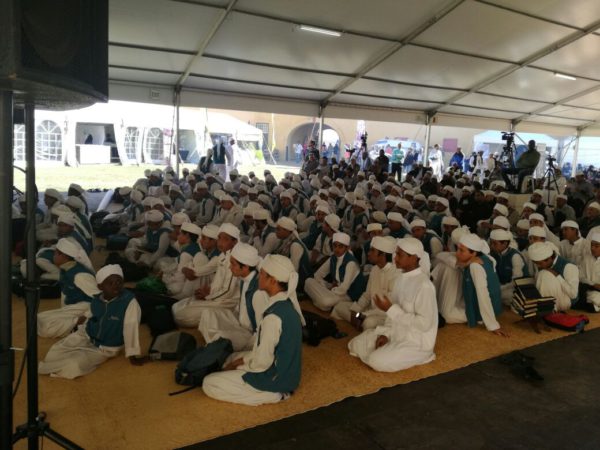In a historic moment for the Cape Muslim community, the melodious verses of the Quran echoed through the chambers of the Castle of Good Hope, as hundreds came together for the first Jumuah prayer on Friday. The Jumuah will be led by Mufti Ibrahim Khalil Awadallah of Masjidul Al-Aqsa in Palestine.
Amongst the stellar qari participating in Friday’s programme are Hosain Parker, Sheigh Mohammad Philander, Shaykh Abubakr Abdura-oef, Shaykh Abdula Allie, Shaykh Mohammad Karriem and well known Shaykh Abduragmaan Sadien.

On 2 January 1666, the first foundation stone of the Castle of Good Hope was laid at the foot of the Leerdam Bastion. While the Castle is still viewed as the most conspicuous symbols of colonial rule, organisers hope today’s event will be one of inclusion, healing, hope and nation-building.
The Castle holds the painful pasts and can tell the harrowing tales of the slaves who worked here – and the prisoners who were detained here. The 350 year monument remains a bastion of colonialism, but the first Jumuah is symbolic of the religious freedom and cultural tolerance that many Muslims take for granted in a free and democratic South Africa.

“Our forefathers were incarcerated in the dungeons of this castle, so the performance of the first Jumuah is ground-breaking. We are very excited and look forward to the message from Shaykh Ibrahim Khalil Awadallah and the Palestinian people,” IPSA principal Shaykh Ihsaan Taliep, one of the coordinators of the Jumuah.
The event forms part of a ramadan expo, which kicks off on Friday until Sunday May 21st. The expo is significant as it bring host a myriad of religious, educational and cultural programmes, as well as a Ramadan souk.

The expo also coincides with the 7th Annual Wasatiyyah Symposium on Saturday, hosted by the International Peace College South Africa (IPSA) in association with Afro-Middle East Centre (AMEC). The theme for this year’s event is titled ISIS in South Africa? Measuring its Scope and Mitigating its Influence. The annual Wasatiyyah symposium is IPSA’s flagship event that reflects its “middle-way” educational philosophy.

“As a country, we are in a sensitive discourse of decoloniality and decolonisation. So it’s quite significant that we will be spending the weekend at the last citadel of colonisation that we as a community have not quite utilised,” added Shaykh Taliep.
The symposium is free and open to the public, however RSVP is essential as seating is limited. RSVP to npatel@ipsa-edu.org to secure your symposium e-ticket. VOC









